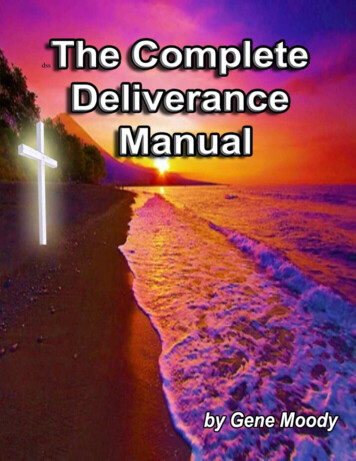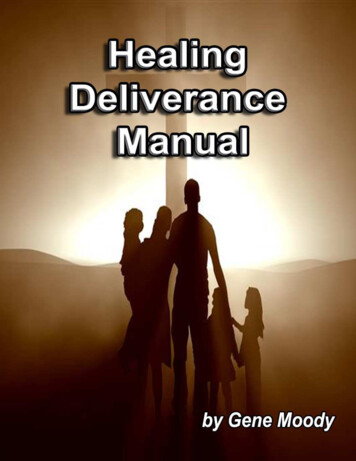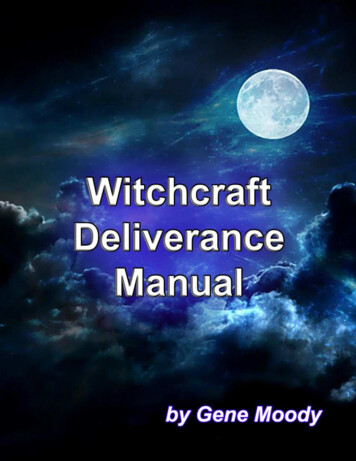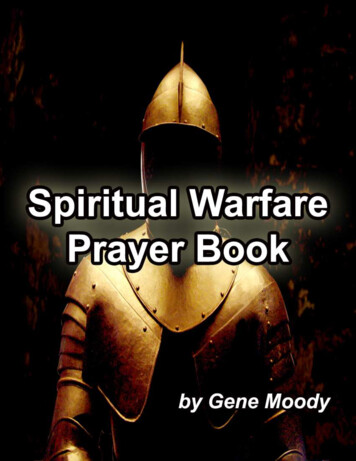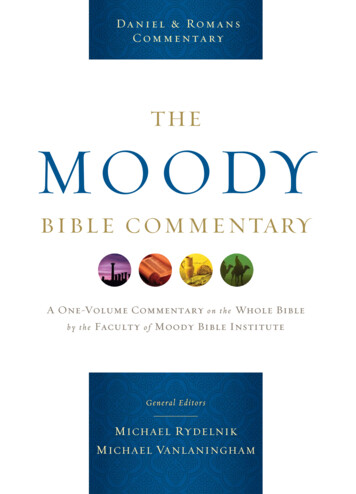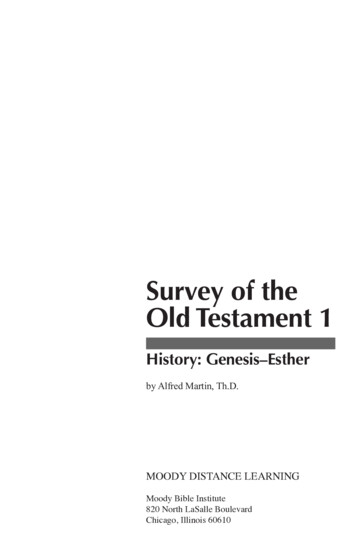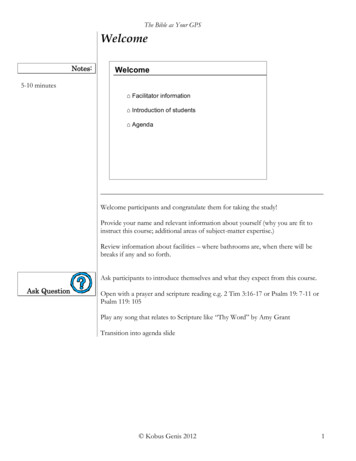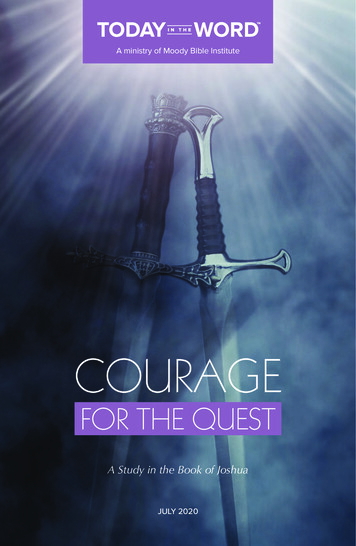
Transcription
A ministry of Moody Bible InstituteA Study in the Book of JoshuaJULY 2020
Today with Mark JobeCrossing the BorderFrom the President of Moody Bible Institute“I encounter many believers who are stuck in a spiritual desert.God has set you free, but you’ve never crossed the border.You are not in the place God wants you to be.”Crossing a bordersecurity checkpoint can beintimidating. Onone such trip,while passingthrough Frankfurt,Germany, I wasasked to show my identification. Thesecurity officer flipped through thepages of my passport, shook her headsternly, and handed it back to me. “Ican’t let you in,” she declared. “Thereis nowhere left to stamp.” My stomachflipped. Frantically, I paged throughthe booklet and was relieved todiscover one empty space. One littlething had almost sabotaged my tripand kept me from crossing the border.I wonder how many of us,spiritually, are kept on this side of theborder, away from where God wantsus to be? I encounter many believerswho are stuck in a spiritual desert.God has set you free, but you’ve nevercrossed the border. You are exhausted,anxious, failing to experience thespiritual rest that God has promisedHis children (Hebrews 4).In this month’s study of Joshua,the Israelites were waiting at theborder of the Promised Land, theplace God had prepared for them.(800) 356-6639Free from slavery in Egypt, theyfollowed Moses into the desert. Butbecause of their disobedience andunbelief, the journey was long andarduous. Unwilling to trust God, theyfound themselves stuck in a place theydidn’t want to be, unable to enter thePromised Land for 40 years.This land was the fulfillment ofGod’s promises to His people, givingthem expanded territory (Josh. 1:3, 4),victory over their opponents (v. 5), Hisclose companionship, strength, andcourage (v. 6). What was required ofthem? To be strong and courageous,obedient to God’s Law, with a laserfocus on Him (vv. 7–9). But they werestuck; and we can get stuck also. Weare often reluctant to step out in faithwhen God calls us, and this delayedobedience is always disobedience.Friend, if you hear God callingyou, do not harden your heart. Theauthor of Hebrews challenges us tofollow God out of the desert and intoHis promises: “Since the promise ofentering His rest still stands, let usbe careful that none of you be foundto have fallen short of it” (Heb. 4:1).Stepping forward in faith, we can liveout the truth of our salvation, followHim in obedience, and enter Hisabundant rest.
Practical TheologyWho Owns the Land?by Dr. John Koessler“We must recognize that everything we call our ownultimately belongs to God. We are merely caretakers andstewards of all the goods and gifts which God has provided.”Readers of the book of Joshua maybe troubled by his command to “takepossession of the land” (Josh. 1:11).We know that others were alreadyliving in Canaan. What right did Joshuahave to issue such a directive?First, the Bible teaches that thewhole earth is God’s possession. Notonly does God have authority over theland, but He also exercises sovereigntyover those who dwell on it. Psalm 24:1declares, “The earth is the Lord’s, andeverything in it, the world, and all wholive in it.” Second, the Bible makes itclear that God’s hand played a rolein determining where people havesettled across the globe throughouthistory. According to Acts 17:26, “Fromone man he made all the nations,that they should inhabit the wholeearth.” Third, Israel’s dispossessionof the people of Canaan was botha fulfillment of God’s promiseto Abraham and an act of divinejudgment.The Lord made a covenant withAbraham to give the land to him andhis descendants as an inheritance(Gen. 15:7, 18–19). He warnedFor Further StudyAbraham that He would judge thosealready living in the land of Canaanbecause of their sin (Gen. 15:16).As Old Testament commentatorDerek Kidner points out, Joshua’scommand was an exercise of justice,not aggression. What is more, the Lordwaited patiently for four generationsbefore carrying out this threat. Duringthat time, Abraham’s descendantswere sold into slavery in Egypt. Kidnerexplains, “Until it was right to invade,God’s people must wait, [even if] itcost them centuries of hardship.”Joshua led Israel into Canaan toreceive their inheritance from God.Although they took possession ofthe land, they did not own it. Theywere stewards and caretakers of whatbelonged to God. The Israelites couldnot sell the land permanently (Lev.25:23). Every fifty years, the propertyhad to be returned to those whooriginally inherited it. In the same way,we must recognize that everythingwe call our own ultimately belongs toGod. We are merely caretakers andstewards of all the goods and giftswhich God has provided. To learn more about the book of Joshua, read Joshua: No Falling Wordsby Dale Ralph Davis (Christian Focus).MOODY BIBLE INSTITUTE
Go DeeperWe hope these questions will help you consider (or discuss with others) whatGod is teaching you through this month’s study of His Word. We’ve left a bitof room to write down your thoughts as well!WEEK 1: Do you have quests or missions coming up in the year ahead? Makea list and pray over it this month as we follow Joshua’s quest.WEEK 2: What victories has God delivered to you throughout your life?How can you remind yourself of them when times get tough?WEEK 3: How can you become a strong and courageous leader to the peoplein your circle of influence?WEEK 4: Have you declared a determination for your home, your family, oryour business to “serve the Lord” (Josh. 24:15)? What changes might you maketo clearly show this commitment?For additional discussion questions, see our website, todayintheword.org, or theToday in the Word app.(800) 356-6639
July 2020Joshua: Courage for the QuestBe strong and courageous. Do not be afraid; do not be discouraged, for theLORD your God will be with you wherever you go.—Joshua 1:9Imagine, you are on a journey to a new land. You’ve wandered in the desert fordecades, your leader has died, and you have to fight bloody battles to claim theland you were promised. What would be the source of your strength, resilience,determination? We’ll find answers in this month’s study—the book of Joshua.The people of Israel and their new leader, Joshua, could keep their couragebecause the Lord kept His promises. As we follow the Israelites’ quest to thePromised Land—the crossing of the Jordan River, the victories at Jericho andAi, the deception of the Gibeonites and dividing of the Land—we’ll see thatGod was with them all the way. Through His faithfulness their mission wouldbe accomplished.God has a calling and a destiny for each one of us. No matter the difficultyof the quest, we can be “strong and courageous” because our faithful Lord willfulfill His promises for us, as He did for Joshua. We pray the lessons from the lifeof Joshua will help you: Be courageous and brave even in the most difficult times Each day, choose to align your life with God’s Word Learn to be a strong and resilient leader It’s a joy and a privilege to study the Bible with the Today in the Word family.Thank you for your friendship, support, and prayers for this ministry.VOLUME 33 ISSUE 7Managing Editor: Jamie Janosz Senior Editor: Elena Mafter Contributing Editor: John Koessler Writer: ChrisRappazini Art Director: Lynn Gabalec Graphic Designer: Rachel Hutcheson Marketing & Production: Paul B. CurrieMoody Bible Institute is the sole publisher of Today in the Word, copyright 2020 by Moody Bible Institute. All rightsreserved. Please direct all Today in the Word inquiries to Donor Resource Management, 820 N. LaSalle Blvd., Chicago,IL 60610. Scripture taken from the Holy Bible, New International Version , NIV , copyright 1973, 1978, 1984, 2011by Biblica, Inc. Used by permission. All rights reserved worldwide. Scripture taken from the New American StandardBible , copyright 1960, 1962, 1963, 1968, 1971, 1972, 1973, 1975, 1977, 1995 by the Lockman Foundation. Usedby permission. Printed in the U.S.A. Today in the Word is published monthly. Printed on 30% recycled paper.TODAYINTHEWORD.ORG
Wednesday, July 1Beginning AgainRead Deuteronomy 34:1–12Teach me to do your will, for you are my God;may your good Spirit lead me on level ground.—Psalm 143:10If you were asked to name a famousbasketball player, Michael Jordanmight immediately come to mind.Jordan helped the Chicago Bullsclaim 6 championships in 8 years andbecome one of the greatest basketballdynasties of all time. In 1998, Jordandecided it was time to step down.Then head coach, Phil Jackson,departed, and other players weretraded or resigned. For the Bulls, itwas the end of an era.The conclusion of Deuteronomymarks the end of an era for God’speople. Moses had successfully ledthe Jewish people out of Egyptiancaptivity, across treacherous deserts,and to the Promised Land. However,The Lord prohibited Moses to enter,and he died in Moab (v. 5). The end ofMoses’ leadership must have been agut-punch to the Israelites. After theappropriate time of mourning (v. 8),they were ready to fulfill their Godgiven destiny and enter the PromisedLand, but who would lead them?While the answer may have beenunclear to them, God knew whowould continue their quest. Joshuawas filled with “the spirit of wisdom”which was passed down from hismentor (v. 9). He was now qualifiedto govern the people because he hadbeen chosen by Moses through thepower of the Holy Spirit. The Lordwould continue to be with His peopleand with Joshua, just as He had beenwith Moses.This must have been anexhilarating, yet unsettling time for theIsraelites. They stood on the banks ofthe Jordan waiting and watching. Theother side was uncharted territory.They had made it to the edge of thePromised Land, but how would theygo forward? Would their new leaderbe up for the quest? Have you ever had to continueon after your beloved boss, pastor,or co-worker retired? Sometimesthe Lord places us in predicamentswe are unsure if we can handle. Weinvite you to journey with us throughthe amazing and exhilarating questfound in the book of Joshua.Pray with UsAs we follow the Israelites’ quest to reach the Promised Land, we pray thatthe Lord will show us what we need to take away from the book of Joshuathis month.6TODAY IN THE WORD
Thursday, July 2A Confident Young SpyRead Numbers 14:1–9If the LORD is pleased with us, he will lead us into that land.—Numbers 14:8We first meet Joshua as a youngspy. Moses sent Joshua and 11 otherleaders, each one from his ancestraltribe, to explore the land of Canaan.But their report back left everyone indismay. Powerful warriors occupiedthe land, and fear swept from tentto tent as the people cried: “If onlywe had died in Egypt! Or in thiswilderness! Why is the LORD bringingus to this land only to let us fall by thesword?” (vv. 2–3). They even suggestedleaving Moses, choosing a new leader,and returning to slavery in Egypt.Would their journey be all fornothing: the miracles performed,the miles trekked, and the desertobstacles overcome? Then, while thewhole assembly watched, a youngspy and his friend spoke up offeringa different and godly perspective.Joshua and Caleb pled with thepeople that the land they explored,an “exceedingly good” land, couldbe theirs because the Lord wouldbe with them (vv. 7–9).Joshua’s and Caleb’s confidencecould only come from the Lord. Itprobably took as much courage toraise their voices against their familyand friends as was needed to scoutout the land. Nonetheless, they spoketruth because they were confidentthat the Lord was bringing them ontheir quest for a purpose.More time would pass before thepeople were fully prepared to enterinto the Promised Land, but youngJoshua and Caleb stood their groundwhen everyone else was ready towalk away. Joshua’s confidence in theLord is one of the many reasons whyMoses would mentor him and theLord chose him to be the people’sleader for the most challenging questthey ever faced, entering into thePromised Land. If you were in Joshua’s sandalswhat would you have done? Wouldyou have the courage to speak up forwhat was right and godly? Standingup for what is right may be challengingbecause of what others will think orsay. But true confidence comes fromthe Lord.Pray with UsIn today’s reading, Joshua and Caleb give us an inspiring example of courageand reliance on God. May we stay strong and faithful to the Lord even in themost adverse circumstances.MOODY BIBLE INSTITUTE7
Friday, July 3Be Strong and CourageousRead Joshua 1:1–9Do not be afraid; do not be discouraged, for the LORDyour God will be with you wherever you go.—Joshua 1:7Imagine you heard on the eveningnews that a band of nomads wasattempting to take over a fortifiedcity. Nobody would think they stood achance, especially if their experiencedleader had just died. As Joshua ledthe Israelites into the Promised Land,it wasn’t just them against the world.We know that God was with themevery step of the way (vv. 6, 9).Nevertheless, their journey wouldnot be easy. That is why three times intoday’s passage, you read the phrase“be strong and courageous” (vv. 6,7, 9). It doesn’t seem like Joshualacked confidence. After all, he hadvolunteered to be a spy, and raisedhis hand when everyone wanted toturn back. Moses even handpickedthe young man to be his personalaide. Rather, the Lord knew that thequest Joshua and the Israelites wereabout to embark on was going to bechallenging physically, emotionally,and spiritually. Not only would ittake all of their might, resilience,and composure, it would take allof their courage.The key to success for Joshuaand the Israelites came not fromstrength and courage but from arelationship with the God whoselaws and commandments went withthem wherever they roamed. TheLaw taught God’s people how to liverighteously in obedience to Him.It also showed them their need forGod’s grace and forgiveness. Unlikethe barbaric and vicious living oftheir contemporaries, God called Hispeople to be different. Their questwas tough. The road was long. Wouldthey be able to find God’s power to bestrong and courageous? Stay tuned. Finding strength and courage indifficult situations does not alwayscome from within. Rather, it comesfrom finding God even in the midst ofyour circumstances. God promises togive you the strength you need. Whatsituation are you facing today? Thecourage you need is there for asking!Pray with UsAre you going through difficulties right now? Today’s passage shows us thatto endure, we need to find God in the midst of trials. Ask Him to give you thestrength you need.8TODAY IN THE WORD
Saturday, July 4Stand UnitedRead Joshua 1:10–18Make every effort to keep the unity of the Spiritthrough the bond of peace.—Ephesians 4:3Where did we get the phrase“United we stand, divided we fall”?The concept is a biblical one (Mark3:25), but the phrase was penned in1768 by John Dickinson, one of theFounding Fathers of the United Statesof America. In “The Liberty Song”Dickinson expressed the magnitudeof the quest for the young nationand the importance of unity andcollaboration: “Then join hand inhand, brave Americans all! By unitingwe stand, by dividing we fall!”In today’s passage Joshua and hisofficers were preparing the peopleto gather supplies for their quest. In afew days they would cross the JordanRiver and attempt to take possessionof the Promised Land which the Lordwas giving them (vv. 10–11). Thisinvolved not just one person, buteveryone. In verse 11, Joshua usedthe second person pronoun five times.Every single person needed to be onboard for this treacherous campaign.In verses 12 to 16, Joshua stresses thevalue of unity with those who hadalready received their inheritanceeast of the Jordan. The Reubenites,the Gadites, and the half-tribeof Manasseh had no compellingreason to leave their families orrisk their lives. However, they couldnot sit on the sidelines while theirneighbors went off to battle. This wasa testimony to the Jewish value ofcompanionship. German theologianOtto Eissfeldt observed, “To Israelitethought, unity is prior to diversity, thecommunity is prior to the individual.”The tribes’ response (vv. 16 –18)demonstrated that they were loyal toMoses, faithful to one another, butmore importantly, they were devotedto God. Did God need them to fightHis battles? No. Were their lives morepurposeful, complete, and honoring tothe Lord because of their willingnessto stand with their neighbors?Absolutely! Today we celebrate the U.S.Independence Day. We rememberthe courage and unity of those whofought to establish this nation. Howcan we promote a commitmentto unity within the body of Christ?Pray with UsLet’s pray according to the apostle Paul’s exhortation in today’s key verse to“keep the unity of the Spirit through the bond of peace.” May we strengthenour unity with fellow believers!MOODY BIBLE INSTITUTE9
Sunday, July 5No Turning BackRead Joshua 2:1–14For the LORD your God is God in heaven aboveand on the earth below.—Joshua 2:11The day after the signing of theDeclaration of Independence musthave been a surreal moment for theFounding Fathers. They knew the realbattle had only begun. There was noturning back. And in our text today,there was no turning back for Joshuaand the Israelites. In his first move asthe nation’s leader, Joshua sent twospies to scout out their enemies. Littledid the spies know that help wouldcome from an unlikely place.The spies entered the land,although not undetected, and hidin the home of Rahab, a prostitute(v. 1). We will look at Rahab’s lifemore closely tomorrow, but herconversation with the spies issignificant. Even though they were thefirst Israelites to ever set foot insidethe walls of Jericho, the testimony andreputation of Yahweh was clearly wellknown. Rahab stated that the heartsof her entire country had “meltedin fear” when they heard of whathappened in Egypt and to Sihon andOg (v. 11). This phrase refers to onewho is utterly distressed with fear andanxiety. Israel’s God had a powerfulreputation!Even though Rahab was anoutsider and knew very little abouttheir history, she confessed her beliefthat their God was indeed the onetrue God (v. 11). She agreed to shelterthe spies in exchange for her securityand the safety of her family (v. 13).What bravery they all showed at thestart of this quest: not just Joshua andthe spies, but Rahab too. There wasno turning back. They would be okayif they were on God’s side. You are probably inspired whenyou hear about God working in thelives of others. God works in people’slives so that His name and renownwill be widespread and glorified.Today, tell someone—or share onsocial media—about a way God hasworked in your life.Pray with UsThe story of Rahab in today’s reading gives us a glimpse into God’s guidance inpeople’s lives. Remember, the same God is sovereign in your life! Praise Him forHis love, grace, and mercy.10 TODAY IN THE WORD
Monday, July 6A Scarlet RopeRead Joshua 2:15–24By faith the prostitute Rahab, because she welcomed the spies,was not killed with those who were disobedient.—Hebrews 11:31In Nathaniel Hawthorne’s classic,The Scarlet Letter, Hester Prynnewas required to wear a scarlet “A” tosignify her shame for having a babyout of wedlock. Humiliation andsocial stigmatizing were thought tobe an appropriate punishment for awoman who committed adultery. Ifthis had taken place in Joshua’s time,Rahab might have been forced towear a scarlet letter as well. She wasthe town’s prostitute, the infamousadulteress of Jericho.But the Israelite spies believed herplace would be the perfect hideout.What happened next would changethe trajectory of her life. In our texttoday, perhaps for the first time inher life, Rahab became a hero. Shesaved the spies and, in due time, herfamily as well. Rahab agreed not tosay a word about the spies and to tiea scarlet cord, or rope, outside thewindow where she let the men down(v. 18). This way, when they returned,they would know which home tospare from destruction.It must have taken tremendouscourage for Rahab to let the spiesleave. If the Jericho king and his mendiscovered her betrayal, Rahab wouldmost likely have been tortured andmurdered. Nonetheless, she kepther promise and did everythingjust as they agreed. Perhaps shewas searching not just for a wayout of Jericho, but a way out of herold way of living. Rahab’s brave actis remembered by the author ofHebrews, in the passage often referredto as the Hall of Faith (Heb. 11:31). Asshe obediently tied that scarlet rope(Josh. 2:21), her faith triumphed overher fear. God used that scarlet ropeas a symbol of faith. Have you ever been given alabel? Maybe you’ve been calledslow, failure, old, or even a mistake?No matter what label people havegiven you, God calls you loved. Hesees your faith. You are His child. Hereplaces the world’s false labels withthe new identity He alone can give(1 John 3:1).Pray with UsAs we continue to read Rahab’s story, we see a woman at the bottom of thesocial hierarchy becoming a hero for God. Ask the Lord to show you how youcan be a hero of faith no matter what.MOODY BIBLE INSTITUTE 11
Tuesday, July 7God Is Still With UsRead Joshua 3:1–17I am with you as I was with Moses.—Joshua 3:7A leadership transition can be difficult.In times of uncertainty, a myriad ofquestions flood people’s minds: Howwill we make it? What will our futurebe like? How will our new leadertreat us? Churches and ministriescan be especially challenged by thecomplexity of transition. But the oneswho seem to thrive during thosechallenging times remember thatthe Lord is still with them.When Moses led the Israelitesthrough the Red Sea in Exodus 14,it was the unofficial start of theirquest. In today’s text, the crossingof the Jordan marks the unofficialcompletion of their wildernesswanderings and the beginning of theirconquest of the Promised Land. A newchapter had begun for Joshua and theIsraelites. And, while the location andleadership changed, the Lord and Hispresence remained the same.This was an exciting andimportant time for God’s people.Here Joshua gives instructions forthis part of the journey: “Consecrateyourselves, for tomorrow the LORDwill do amazing things among you”(v. 5). Verse 7 is the key verse in thischapter’s narrative. The Lord said toJoshua, “Today I will begin to exalt youin the eyes of all Israel, so they mayknow that I am with you as I was withMoses.” As they embarked on a newchapter, the Lord was still the authorand protector of their lives. Godwould go before them, just as Hehad in the past.We may have times when wewonder if God is really with us. Itis possible this same thought racedthrough the minds of Joshua, thepriests, and the Israelites. That is whythe Lord reminded them that He hadbeen with Moses and their parentsand grandparents (v. 7). What transitions are you facing?Is your church making changes youdon’t agree with? Is your householdbecoming smaller or bigger?Perhaps you are changing jobs orneighborhoods? Whatever quest theLord is taking you on, He is with you.Pray with UsOur passage from Joshua 3 reminds us of the vital importance of godlyleadership. Will you pray for leaders in your church, at the workplace, and inour government?12 TODAY IN THE WORD
Wednesday, July 8Remember the PastRead Joshua 4The hand of the LORD is powerful.—Joshua 4:24Churches and workplaces oftenpublicize their vision or plan for thefuture. And, as individuals, we areencouraged to be forward-thinking.Financial advisors and health careprofessionals remind us to live in away now that will benefit us in yearsto come. But it is also important toconsider our past.After the entire nation passedthrough the rocky bed of the JordanRiver and landed safely on the otherside, the only thing that stood in theway of the land promised to themwas an all-out war (3:17; 4:1). We canimagine the warriors sharpening theirswords, tightening their belts, andstrategizing their combat tactics withone another. However, before the Lordinstructed them to move forward, Hewanted them to take a step back andremember.A leader was selected from eachof the 12 tribes. They were told togo into the dried riverbed wherethe priests remained with the Arkof the Covenant, choose a large stone,and carry it back to the camp (v. 2).In Gilgal, Joshua built an altar to theLord and declared that the stoneswould serve as a reminder for all theIsraelites for generations to come(v. 7). When children would ask theirparents the meaning and purpose ofthe stones, Joshua instructed them topass on the miraculous story of theirriver crossing. They were to emphasizethe presence of Yahweh as theystepped into their promised territory(vv. 21–24). Their mission was not onlyto occupy the Promised Land but alsoto remind their descendants that theLord was and had been with them. Is there something that canremind you of God’s guidance andgrace in your life? Maybe it is aspecial necklace, a newly plantedtree, a sticky note, or even a stone.Use this object as a reminder of whatGod has done in your life. One day,your grandkids might ask, “Whatdoes that mean?”Pray with UsToday’s devotional prompts us to thank God for His guidance and grace in ourlives. During your prayer time, remember specific instances of God leading youand praise Him for His care for you.MOODY BIBLE INSTITUTE 13
Thursday, July 9An Important TraditionRead Joshua 5:1–12Keep my commands and follow them.I am the LORD.—Leviticus 22:31Growing up, my family had the samemeal on Christmas Day and EasterSunday. My wife and I have chosento continue several of our family’straditions, while creating new onesfor our children. Traditions help ushonor and remember the past. Asthis new generation of Israelites wasabout to enter the land they had beenpromised, Joshua made them pause tolook back at what God had done andto honor important traditions.Notice the connection betweenverses 1 and 2. After hearing aboutthe timidity and fear of the Amoriteand Canaanite kings, the Lord andJoshua commanded the Israelitesto be circumcised (vv. 1–3). Verses 4through 7 detail the rationale behindthis command—“Now this is why hedid so” (v. 4). The place was namedGilgal (a word which sounded like theHebrew word for “to roll”) becausethe Lord told Joshua that with thisimportant tradition He had “rolledaway the reproach of Egypt” (v. 9). Inthe Hebrew language, this could alsobe translated, “removed the shameof Egypt from you.” It had been 400years since God promised the landto their forefathers, and 38 yearssince they left Egypt. The tradition ofcircumcision was the Lord’s reminderto them that they were His covenantpeople. And this obedient generationwould enter the land.They could not eliminate whathad happened in their past. WithGod’s help, however, they couldremove the emotional and spiritualburdens they had carried on theirflight from Egypt. Verses 10–12describe another important tradition,the Passover. The next day, theytasted food from their long-awaitedPromised Land. Just as tradition played animportant role for the nation of Israel,traditions hold an important place inour lives today. What traditions do youhave that are special to you and yourfamily? Do you have any that remindyou of what the Lord has done in yourlife? If not, now is a great time to starta faith tradition!Pray with UsOur Scripture reading today shows the importance of following God’scommandments and praising Him in prayer. Let’s pray we will do bothof these things in our own walk with Him.14 TODAY IN THE WORD
Friday, July 10The Holy WarriorRead Joshua 5:13–15What message does my LORDhave for his servant?—Joshua 5:14Throughout history, alliances havebeen essential for victory. The Alliesin WWII and the 32-nation coalitionin the 1990s Gulf War are just twoexamples of how countries bandtogether in a time of conflict. Intoday’s reading, our hero Joshuawas preparing to face off with anunexpected opponent. With sweatyhands and adrenaline pumping, helifted his sword and asked, “Are youfor us or for our enemies?” (v. 13).The warrior instead gave analternative answer: “Neither” (v.14). And then, the mysterious figurerevealed his true identity andreason for stopping Joshua; he wasa “commander of the army of theLORD” (v. 14). Immediately, Joshua fellface down in reverence and respect.He did not know who this warriorwas, but he recognized that whoeverhe was, he was sent from the Lord.Joshua revealed his own identity andinstead of referring to himself as the“Successor of Moses” or “Leader ofthe Israelites” he identifies himself asthe Lord’s “servant” (v. 14) Then heasked what message this commanderwas bringing.The commander replied with arequest that may seem odd to modernreaders. He asked Joshua to removehis sandals, which represented hishumanity and contact with a “filthy”world. The place he was standingwas set apart by God and holy (v. 15).Because Joshua knew about Moses’encounters with Yahweh (see Ex.3:4–6), he would have been awarethat the man standing before him wasnone other than the same one whoappeared to Moses in the burningbush. Both leaders, chosen by God,had a similar experience. The textconcludes simply, “And Joshua did so”(v. 15). He was in total submission tothe Lord. It is probably unlikely that theCommander of the Lord’s armywill stop you in your tracks today.However, his question should probeour hearts. Instead of asking if Godis on our side, we should ask, “Arewe on God’s side?”Pray with UsLord, we thank you for today’s devotional that shows us the qualities of a truewarrior for God! Give us wisdom and determination to follow you whereveryou lead us.MOODY BIBLE INSTITUTE 15
Saturday, July 11The Walls Tumbled DownRead Joshua 6See, I have delivered Jericho into your hands.—Joshua 6:2I remember learning about the battleof Jericho as a child in Sunday School.I don’t recall if the story was told usinga video, felt board, or reenactment,but I do remember thinking, “Howcould this be possible?” WhileI believed God was capable ofperforming miracles and that thefortified walls of Jericho were noproblem for Him,
A Study in the Book of Joshua JULY 2020 800 356 6639 . God has a calling and a destiny for each one of us. No matter the dif culty of the quest, we can be “strong and courageous” because our faithful Lord will ful ll His promises for us
